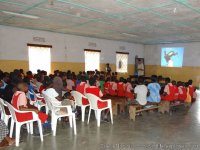Chosun Juan
Given to Fly

.... We are constantly being told that the lack of involvement of "ethnic groups, females, young people" in various activities is "a problem that needs addressed". Why? There always seems to be an assumption that there is a bias involved e.g. "Western racialism". Is that really all there is to it? The birdwatching clubs that I have been involved with bend over backwards to accommodate and attract young members. In fact they try all sorts of things to get new members - ....
I tend to agree with Egret - I really don't like this quota stuff - if you want to go look at birds or stamps (or planes as I often did) then who cares what you are. If ethnic minorities don't want to be involved in things then that's their decision. We shouldn't be forcing people to do activities because that activity's followers should reflect the population.
There must be the reverse too. How many white people play Kabaddi for example or the sitar etc? It's one of those issues that is not an issue but is picked up by the 'multiculturists' who cannot understand that perhaps some people that, according to the quota, should be birdwatching, are not.
I'm not sure I would agree it is bourgeois hobby though, plent of non-middle class people at both ends of the spectrum do it (birdwatching that is)
If they are not birding, then just what exactly are the "ethnic groups, females, young people" doing?
Is it way cooler than what I'm doing?
Why don't I know about it? Why have I been left out?
Why haven't these groups reached out to me to lavish their 'pro-active affirmative equality policies' and "inclusive activities" all over my personage?
Am I being discriminated against?
What about young black females - do they have it 3 times as bad?
What about red ones? yellow ones?
Why are there no young one-legged transgender lesbian indigenous birders?
What if they just like observing natural stuff like whales instead?
Will all of this be solved when the world has interbred to a sufficient degree that we are all a homogenous caramel colour? (homo caramelus)
What religion will they be? What if I don't like it?
Where does all of this leave Red-heads?
Is a lack of appreciation and care for nature any worse when it is from a fat banker; a rampantly breeding third world slash and burner; or drug addled white trash? Will environmental degradation be any better or worse? ......
Chosun :gh:






